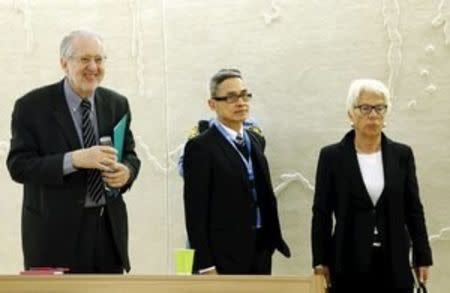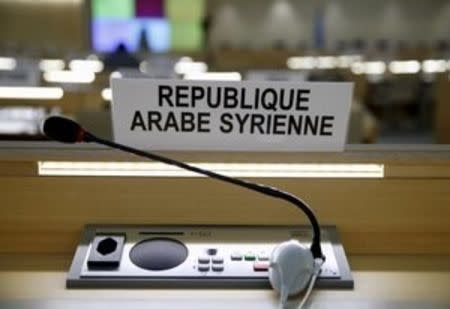Prosecution of Syria war crimes should not wait for war's end - U.N.
By Stephanie Nebehay GENEVA (Reuters) - United Nations war crimes investigators on Syria said on Tuesday that lower-level perpetrators should be prosecuted by foreign authorities until senior military and political figures can be brought before international justice. The U.N. Commission of Inquiry, which has documented atrocities committed by all sides, has compiled a confidential list of suspects and maintains a database with 5,000 interviews. It has begun providing judicial assistance abroad in some cases. Russian warplanes began leaving Syria on Tuesday as Moscow started to draw down forces that have tipped the war President Bashar al-Assad's way. U.N. envoy Staffan de Mistura said he hoped the move would have a positive impact on peace talks under way in Geneva to end a conflict now in its sixth year. [nL5N16N3D0] "The adoption of measures that lay the ground for accountability need not and should not wait for a final peace agreement to be reached," Paulo Pinheiro, chief of the inquiry panel, told the U.N. Human Rights Council. Carla del Ponte, a former U.N. war crimes prosecutor serving on the team, told reporters that it had received about 15 requests for information from various countries. The cases involved low- to middle-level perpetrators or foreign fighters. "It is a start towards international justice," she said. Michael Ratney, U.S. Special Envoy for Syria, condemned atrocities committed by various sides but added: "Assad and his allies have been, from the very beginning, by far the primary source of killing, torture, and deprivation in this war." Perpetrators of crimes will be held accountable, he said, and "it is not a question of if, it is a question of when." Syrian Ambassador Hussam Aala said that rebel groups were firing shells and rockets into residential areas in Damascus and Aleppo, depriving civilians of water and commandeering medical facilities as command centres. Aala said such "terrorist" groups were backed by Qatar, Turkey and Saudi Arabia. "We have been responsible in abiding by the cessation of hostilities in order to preserve Syrian blood." CRIMINAL JUSTICE "Criminal justice is essential but currently the only justice referred is through national courts of member states. We will continue to call for referral to the ICC (International Criminal Court) or an ad hoc tribunal," Pinheiro said. Serious abuses of human rights continue, with thousands detained and tortured, he said, and Islamic State insurgents holding more than 3,000 Yazidi women as sexual slaves. Pinheiro urged the Syrian government and opposition to agree to confidence-building measures such as the unconditional and immediate release of all arbitrarily detained prisoners - especially women and children - and the establishment of a mechanism to trace those missing and an end to sieges. "We are convinced this would lay a foundation to the beginning of a real (political) transition," he said. Pinheiro later told reporters that the issue of prisoners should not be left for the end of the peace process. "This issue must be tackled in the ongoing process." U.S.-Russian cooperation has brought about a lull in the war via a "cessation of hostilities agreement" that led to a sharp decline in fighting between rebels and the government in western Syria, though many violations have been reported. (Reporting by Stephanie Nebehay; Editing by Tom Miles and Mark Heinrich)




